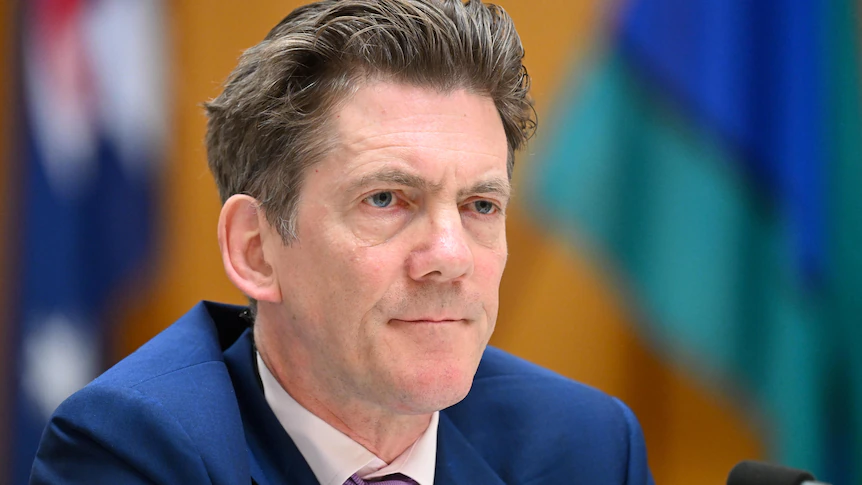Copyright abc

The Reserve Bank has expressed concern the Australian economy may be trapped in the slow lane of economic growth, indefinitely. This would suppress wage growth and household income for millions of Australians for decades. The silver lining is that the central bank believes there is still time for the economy to break free, find clear air and grow faster than its long-term average. "Could Australia find itself trapped on the economic rail like one of the riders in last week's Cup — boxed in by its own capacity constraints?", deputy governor of the Reserve Bank Andrew Hauser asked a Sydney gathering of investment bankers and economists today. "Or will it find ways to break free, through higher productivity and more investment in new capacity? "If it does, we could be off to the races," he said. In simple terms, Mr Hauser says if Australia can boost productivity, the capacity of the economy will expand, and it will be able to tolerate more demand without higher inflation. Inflation tame, but there's a problem Official third-quarter inflation figures show some price hikes came roaring back in the economy. Fingers were pointing at the cost of energy. It had economists convinced the RBA would leave interest rates on hold at its November meeting. The RBA, though, today has reiterated that it is not concerned about the medium-term inflation outlook. "The further decline in inflation through the end of 2024 and into 2025 gave us greater confidence that it would return sustainably to target over the medium term," Mr Hauser said. The problem is that unless productivity picks up, and the RBA inflation models assume it will, increased demand in the economy will put upward pressure on inflation. That is because, as Mr Hauser puts it, the economy as it stands is operating at or close to full capacity. "Most recoveries in GDP growth over the past 40 years typically start with some margin of spare capacity — a negative 'output gap' — as the preceding slowdown pushes the level of aggregate demand below estimates of the potential output of the economy," he said. He is making the simple point that an economic growth phase requires some degree of spare capacity. "As the economy recovers, that buffer typically provides room for a period of above-trend growth in activity and employment, as demand rises back towards potential output, without generating excessive inflationary pressures," Mr Hauser said. Right now, the Australian economy does not appear to have that, so if economic growth accelerates, it will be joined by higher inflation. Matter of urgency Worse still, it is possible, the Reserve Bank says, the Australian economy is currently operating above capacity, at the start of a hoped-for economic growth phase. "This time looks different," Mr Hauser said. "Our central estimate suggests that demand was slightly above potential output at the time GDP growth started to pick up last year — the tightest economic backdrop to a recovery since at least the early 1980s." Mr Hauser believes the problem stems from the "cumulative effect of rapid demand growth in 2021-2022, the deliberately cautious monetary policy strategy of more recent years, and — importantly — weak growth in supply". Critical point for economy It is possible, Mr Hauser points out, that "there's more capacity today than the estimates suggest". In this world, "further policy easing may be necessary at some horizon", which would no doubt be welcomed by millions of mortgage borrowers. But the deputy governor's second scenario is centred on a fear "that the economy may find itself boxed in by its own capacity constraints, like a racehorse trapped against the course fence, unable to surge forward". "On that view, there may be little scope for demand growth to rise further without adding to inflationary pressures, and hence there may be little room for further policy easing." In this environment, millions of households find it difficult to get ahead because any expansion of the economy results in higher inflation. The Reserve Bank, however, wants to remind policy makers that Australia has what it takes to be a world-leading advanced economy, "with extraordinary minerals resources, old and new". Mr Hauser described world-class universities and human capital, Australia enjoying a plumb geographical position in the Asia Pacific, huge domestic savings pool, the second largest median wealth per capita in the world, a strong banking system, proven political and economic institutions, and a long track record of welcoming foreign capital and labour. "If that doesn't scream 'investment potential', I don't know what does," he said. "Seize that opportunity, and we really could be off to the races." Housing versus productivity Australia's extraordinary median wealth per capita, strong banking system, along with foreign capital and labour has also, according to analysts, assisted in pushing property prices to record highs. And economists say that, in turn, has sucked investment away from areas of the economy with more productive potential than the housing market. "Yes, to a certain extent," RSM Australia economist Devika Shivadekar said. "High demand for property means there's always a need for labour. "Being a comparatively low-skilled sector, most of the younger talent naturally gravitates towards building jobs, easier to get working straight from high school, rather than developing technical skills that can help prop up other industries." Other economists say record property prices have stifled Australia's economic capacity more indirectly. "The poor productivity growth in the housing sector has also hurt [Australia's] ability to supply," AMP's deputy chief economist Diana Mousina said. "The two are so interconnected. "I [also] think our tax system and our migration system has created the housing problem that we are in." Meanwhile, Betashares chief economist David Bassanese says incentives for share investors also deserve some of the blame for Australia's weak productivity. "I would save the love affair with dividends and franking instead perhaps has [hurt productivity] as it encourages firms to pay out dividends [rather] than reinvest for growth," he said. Firms reinvesting for growth is precisely what the Reserve Bank believes is a critical pillar for supporting productivity in the Australian economy.



